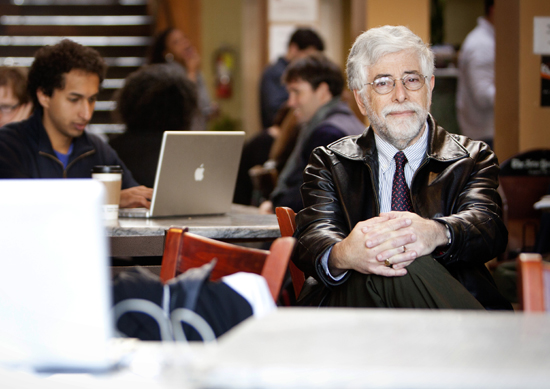We are thrilled to announce a new column by U.C. Berkeley sociologist Claude S. Fischer. In the column, “Made in America,” Fischer will take on the fashionable ideas about American social life reported in the mainstream media and expose them to scientific scrutiny. Web editor David V. Johnson interviewed him by e-mail about his new perch; his first piece for us, on America’s perennial obsession with loneliness; and the peculiar nature of sociological fact.
David Johnson: What is your approach to your new column and why is Boston Review a good home for it?
Claude Fischer: I hope to do in my column what I hope I do with my blog: to bring social history and social scientific perspectives and research to a wider public. The goal is to help better inform our debates about pressing contemporary issues and to enrich our musings about curious aspects of everyday life in America. Boston Review is the right place for it because it is both clearly receptive to the contributions of serious researchers—the recent series on inequality is an example—and it reaches an intellectually and politically active audience.
DJ: In today’s piece you critique the popular myth of an alleged epidemic of loneliness, exemplified, e.g., by The Atlantic’s May cover story. Is this just another piece of regularly recurring media-generated hysteria, or is there something more to say about our perverse obsession with loneliness?
CF: Editors reasonably look for dramatic findings. And if reports have a frisson of threat—say, your food is poisoning you—then they are all the more newsworthy. The loneliness theme, as I remark in today’s column, is an American perennial. It appears in a slightly different form as the “loss of community” that we can find in American letters for centuries. (Thomas Bender’s Community and Social Change in America, and Robert Fowler’s The Dance with Community are a couple of notable explorations of this trope.) Perhaps American culture’s emphasis on individuality, independence, and self-reliance makes the concern about going too far in that direction and away from the voluntary community a particularly gnawing worry, even when there are few objective signs of that threat. I discuss this sort of individual-community tension in my book, Made in America.
DJ: In your column for the May/June issue you take on the rebirth of the “culture of poverty” debate. You begin the column with a thought experiment that one would normally expect from an ethicist. How useful are such exercises for sociological thought?
CF: It is interesting that you describe that as an ethical scenario; you are right, it is one. But it is also a strategic dilemma: If the actor is to successfully manage his or her life, which commitment takes priority: the job or the friendship? We sociologists try to see the world through the eyes of the people we study. But it is hard to do that given that our social worlds are as different and distinctive as anyone else’s. How can well-off PhDs who typically travel in effete intellectual circles (listen to NPR, drive Priuses, etc.) really understand the world views of, say, a rural, evangelical, working-class Kansan? Such thought experiments are only starting points. We then use—or, at least we should use—systematic observations, be they closely observed ethnographies, in-depth interviews, or well-crafted surveys, which allow people to tell us or show us what their lives are like and what choices they make in such situations.
DJ: The “culture of poverty” debate has been reignited recently by Charles Murray, whose cultural analysis, you write, is “not serious.” He is one among many “thought leaders” to gain a wide audience for unserious views. How much blame do you think academic experts bear for ceding the public sphere to these modern-day sophists?
CF: “Sophist” (defined—I had to look it up—as one skilled in devious argumentation) is not quite the term I would use. While Murray’s particular argument about the origins of white, working-class culture cannot be taken seriously, much of what he has argued, in The Bell Curve, for example, is serious, even if, as colleagues and I have argued (in Inequality by Design), it is wrong. On the broader point: Yes, mainstream social scientists have been under-represented in public debates (not economists, however; they seem omnipresent). For many years, I have pressed my colleagues to tell more of what we know to the wider public. In the early 2000s, I was the founding editor of Contexts, a magazine of the American Sociological Association for general readers, a sort of poor man’s Social Scientific American. For various reasons, it did not find a place on airport magazine racks and, although it thrives (see contexts.org), the magazine mostly reaches sociologists and our students. Among the reasons we sociologists have been largely absent in the public dialogue include chronically abysmal writing, too-frequent PC-ness, and not trying enough. But the failure is also on the media’s side—for example, the taste for the sensational (see above), a short attention span, and a desperation for content. (In the latter regard, social science findings are rarely discovered by journalists; they are usually delivered by publicists and often large p.r. campaigns—see Murray, above.) Both sides share some responsibility for the vacuum.
DJ: Do you think American ignorance of sociological facts is akin to our ignorance of scientific facts, or is there something more to the story?
CF: Of course, most Americans are too busy to recall much of the science—or the history, for that matter—that they learned in school (many were too busy during school to learn it, too). While we academics put a weirdly high value on knowing bookish facts, social scientific knowledge is consequential for both society and individuals—say, understanding how schools’ organizational structures might affect learning. Social science in particular has some properties that make public awareness especially difficult. For one, people generally think they already know all that stuff. After all, they live in society; they don’t need to be told about it by some egghead. Such confidence, by the way, is one reason why people often respond to a piece of social science research by saying it is obvious—after hearing what the finding is. (Pick one: money makes people happier; money doesn’t make people happier. Either way the research comes out, many will say the result is obvious. Duncan Watts also discusses this phenomenon in his new book, Everything Is Obvious: *Once You Know the Answer.) Second, people tend to believe comfortable facts. This is true in the natural sciences, too. (My Berkeley colleague, Robb Willer, has found that people are more likely to dismiss global warming as real if they are first told that it would cost a lot to mitigate it.) This shaping of empirical belief is multiplied in the social sciences. For example, the well-off are especially likely to believe that good fortune has nothing to do with success; it is all the result of talent and effort.
DJ: What are you working on nowadays?
CF: Ouch! That is a sore point. In the moments when I’m not teaching or doing administrative work or writing essays, I squeeze in some scholarship. I hope to do some extensive research on how individuals’ personal networks change as they age, and I am dabbling in the genetics and evolutionary debates. Who knows what else might come up? That’s the fun of the academy.








